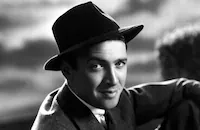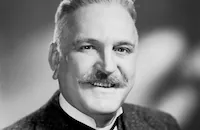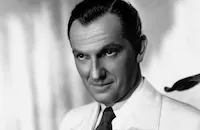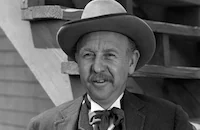The Shop Around the Corner

Brief Synopsis
Cast & Crew
Ernst Lubitsch
Margaret Sullavan
James Stewart
Frank Morgan
Joseph Schildkraut
Sara Haden
Film Details
Technical Specs

Synopsis
At the Budapest shop Matuschek and Company, work Pepi Katona, the snippy errand boy, Pirovitch, the mild-mannered clerk, Alfred Kralik, the bashful yet lovestruck head clerk, the duplicitious Ferencz Vadas, and clerks Ilona and Flora. Each morning, the six line up in front of the shop to await the arrival of their boss, Hugo Matuschek, and while waiting one day, Alfred confides to his friend Pirovitch that he has answered a blind personal ad in the newspaper and has entered into a romance through the post. That morning, Klara Novak enters the shop, looking for a job, and although Alfred turns her down, Matuschek decides to hire the girl when she talks a customer into buying a cigarette box that plays "Otchi Tchorniye," an item which Matuschek loves, but Alfred hates. At work, Klara and Alfred argue incessently, never suspecting that they are carrying on a tender romance through the mail, as Klara is Alfred's secret correspondent. Through their anonymously signed letters, the lovers agree to meet for the first time at a cafe, but that night, Matuschek, thinking that Alfred is the man a private detective agency reports is having an affair with his wife, fires the clerk. Later, when the detective that Matuschek has hired informs him that his wife is actually having an affair with Vadas, he despairs and tries to end his life, but is saved by Pepi. Meanwhile, Alfred arrives at his rendezvous and is astonished to discover that his secret love is Klara. He approaches her as a co-worker and does not divulge his secret identity, and when she berates him, he leaves. Later that night, Alfred is summoned to the hospital bed of the ailing Matuschek who appoints him store manager and begs him for forgiveness. After firing Vadas, Alfred rallies the store employees, and on Christmas Eve, Matuschek returns to a happy reunion of his employee family in the shop. Once everyone else has departed, Klara confides to Alfred that she finds him attractive, and he finally reveals himself as her secret lover.

Director

Ernst Lubitsch
Cast

Margaret Sullavan

James Stewart

Frank Morgan

Joseph Schildkraut

Sara Haden

Felix Bressart
William Tracy
Inez Courtney
Sarah Edwards
Edwin Maxwell

Charles Halton
Charles Smith
Grace Hayle

Charlie Arnt
Gertrude Simpson
William Edmunds
Mary Carr
Mabel Colcord
Renie Riano
Claire Du Brey
Ruth Warren
Joan Blair
Mira Mckinney
Crew
Cedric Gibbons
Sydney Guilaroff
Werner R. Heymann
Horace Hough
Ernst Lubitsch
Samson Raphaelson
Arthur Rose
Wade B. Rubottom
Gene Ruggiero
Douglas Shearer
Edwin B. Willis

Photo Collections
Videos
Movie Clip





Trailer
Hosted Intro







Film Details
Technical Specs

Articles
Behind the Camera (8/20 & 12/24) - THE SHOP AROUND THE CORNER
James Stewart was at the top of Ernst Lubitsch's list to play the simple Alfred Kralik because the actor was "the antithesis of the old-time matinee idol; he holds his public by his very lack of a handsome face or suave manner."
At first, European actress Dolly Haas was penciled in for the female lead, but Lubitsch had second thoughts about casting an unknown actress for American audiences.
Ernst Lubitsch waited for James Stewart and Margaret Sullavan - his personal picks for the film's leads - to become available in the midst of their busy schedules. In the meantime, he shot and completed Ninotchka, starring Greta Garbo and Melvyn Douglas.
While directing The Shop Around the Corner, Ernst Lubitsch drew upon his extensive experiences working in his father's Berlin shop as a young lad.
At the film's January 25, 1940 premiere at Radio City Music Hall, Lubitsch remarked, "I have known just such a little shop in Budapest...The feeling between the boss and those who work for him is pretty much the same the world over, it seems to me. Everyone is afraid of losing his job and everyone knows how little human worries can affect his job. If the boss has a touch of dyspepsia, better be careful not to step on his toes; when things have gone well with him, the whole staff reflects his good humor."
In preparation for her character, Margaret Sullavan purchased a simple dress for $1.95 that she thought a shop girl would wear but Ernst Lubitsch took one look and told her it was too stylish.
James Stewart and Margaret Sullavan had known each other a long time before making The Shop Around the Corner. Both were in a summer stock company called the University Players. It was there that Stewart realized his potential as an actor, so he followed Sullavan and fellow player Henry Fonda to New York to begin an acting career in earnest.
Even though Margaret Sullavan was infamous for her quick temper and disdainful attitude towards Hollywood, James Stewart counted working with her as one of the great joys of his professional career. And because he knew her personally, he was more equipped than most of the cast and crew members to deal with her frequent and volatile emotional outbursts.
Even James Stewart could get flustered working with Margaret Sullavan, though, and one day it took him forty-eight takes to get a scene right. Stewart said: "We were in this little restaurant and I had the line: 'I will come out on the street and I will roll my trousers up to my knees.' For some reason I couldn't say it. She was furious. She said, 'This is absolutely ridiculous.' There I was standing with my trousers rolled up to my knees, very conscious of my skinny legs, and I said, 'I don't want to act today; get a fellow with decent legs and just show them.' Margaret said, 'Then I absolutely refuse to do the picture.' So we did more takes."
Soon after wrapping principal photography, Ernst Lubitsch talked to the New York Sun in January 1940. "It's not a big picture, just a quiet little story that seemed to have some charm. It didn't cost very much, for such a cast, under $500,000. It was made in twenty-eight days. I hope it has some charm."
by Scott McGee

Behind the Camera (8/20 & 12/24) - THE SHOP AROUND THE CORNER
The Shop Around The Corner - The Shop Around The Corner
Lubitsch, who had signed with MGM to direct Ninotchka (1939) and one other film, owned the rights to a Hungarian play called Parfumerie, by Nikolaus Laszlo. (In the play, the secret lovers work in a perfume shop.) Lubitsch sold the property to the studio for $62,500 as his second production. In adapting the playas The Shop Around the Corner, both Lubitsch and scenarist Samson Raphaelson drew upon their personal histories. Lubtitsch had helped out in his father's tailor shop in Berlin as a youth, and Raphaelson had worked in a shop during the World's Columbian Exposition in Chicago just before the turn of the century. To make sure his film was stripped of the glamour usually associated with him, Lubitsch went to such lengths as ordering that a dress Sullavan had purchased off the rack for $1.98 be left in the sun to bleach and altered to fit poorly.
Stewart, enjoying a professional peak during a period that also included You Can't Take It With You (1938), Mr. Smith Goes to Washington (1939) and his Oscar-winning performance in The Philadelphia Story (1940), would remember The Shop Around the Corner as one of his favorite films. He had been great friends with Sullavan since their early days in the theater in the 1920s, and some biographers have speculated that unrequited love for the actress (who married Stewart's pal, Henry Fonda, in 1931) was the reason Stewart remained a bachelor until 1949.
The modestly produced The Shop Around the Corner was a surprise hit, earning international profits of $380,000 at a time when Hollywood films were waning in the European market. Its influence has continued to be felt in various reincarnations of the story, first as a Judy Garland film musical called In the Good Old Summertime (1949), then as a 1963 Broadway musical entitled She Loves Me that was revived in 1993. In You've Got Mail (1998), the story was updated to the electronic age by having the secret lovers played by Tom Hanks and Meg Ryan correspond through email.
Producer/Director: Ernst Lubitsch
Screenplay: Samson Raphaelson, Ben Hecht (uncredited), from a play by Miklos Laszlo
Art Direction: Cedric Gibbons
Cinematography: William Daniels
Editing: Gene Ruggiero
Original Music: Walter R. Heymann
Principal Cast: Margaret Sullavan (Klara Novak), James Stewart (Alfred Kralik), Frank Morgan (Hugo Matuschek), Joseph Schildkraut (Ferencz Vadas), Sara Haden (Flora Katcuck), Felix Bressart (Pirovitch)
BW-99m. Close captioning. Descriptive video.
By Roger Fristoe
The Shop Around The Corner - The Shop Around The Corner
Quotes
Yes, Mr. Matuschek- Alfred Kralik
Eh, close the door. Kralik, why did you put me in that situation, in front of the whole shop?- Hugo Matuschek
Well, I'm very sorry, sir... but it was not my fault.- Alfred Kralik
Well whose fault was it? Mine?- Hugo Matuschek
Well... yes.- Alfred Kralik
: Oh, my Dear Friend, my heart was trembling as I walked into the post office, and there you were, lying in Box 237. I took you out of your envelope and read you, read you right there.- Klara Novak (Miss Novak)
There might be a lot we don't know about each other. You know, people seldom go to the trouble of scratching the surface of things to find the inner truth.- Alfred Kralik
Well I really wouldn't care to scratch your surface, Mr. Kralik, because I know exactly what I'd find. Instead of a heart, a hand-bag. Instead of a soul, a suitcase. And instead of an intellect, a cigarette lighter... which doesn't work.- Klara Novak (Miss Novak)
Flora, take a letter. Ah... To whom it may concern. Mr. Vadas has been in the employ of Matuschek & Company for the last two years, during which he has been very efficient as a stool pigeon, a troublemaker, and a rat.- Alfred Kralik
Now look here!- Ferenc Vadas
And if he doesn't clear out of here he's going to get a punch in the nose! Yours very truly, Alfred Kralik, Manager, Matuschek & Company.- Alfred Kralik
Now if I were a girl and had to choose between a young good-for-nothing with plenty of hair and a good, solid, mature citizen, I'd pick Mathias Popkin every time.- Alfred Kralik
Trivia
All scenes were reportedly shot in sequence.
The director, Ernst Lubitsch, delayed the start of the movie until both 'Stewart, James' and Margaret Sullivan were available. In the mean time, Lubitsch filmed Ninotchka.
Notes
According to Daily Variety news items, the rights to the Nikolaus László play on which this film was based were originally purchased by Ernst Lubitsch in 1938 with the intention to film it in an independent "share-the-profits" deal with Myron Selznick using his own company, Ernst Lubitsch Productions. Negotiations for the film's release were conducted with Paramount, RKO and United Artists, and Lubitsch planned to begin filming at the end of October 1938, but the deal failed to materialize, and when Lubitsch signed with M-G-M in January 1939, he included the story property in the deal with the proviso that he direct it. A November 1938 New York Times news item indicated that Lubitsch purchased the rights to the play for approximately $7,500. A July 1938 Los Angeles Times news item noted that Dolly Haas was originally set to appear in the picture. Daily Variety reported in October 1938 that Janet Gaynor was the likely candidate for the female lead. According to a January 1940 New York Herald Tribune article, "all scenes in the film were shot in the order in which they occur in the narrative." Studio publicity material indicates that because Margaret Sullavan and James Stewart were not available at the time that production was originally set to begin, Lubitsch decided to postpone the start date and wait until they were available. While waiting for Sullavan and Stewart, Lubitsch worked on Ninotchka. A 1940 Hollywood Reporter news item notes that Stewart and Sullavan were set to recreate their roles for a 29 September radio version of Shop Around the Corner on the Gulf-Screen Guild Show. Another film based on László's play was the 1949 musical M-G-M picture In the Good Old Summertime, directed by Robert Z. Leonard and starring Judy Garland and Van Johnson. A musical stage version of the play, entitled She Loves Me, opened in New York on April 23, 1963. She Loves Me was later produced as a teleplay by BBC, and aired on the PBS network on December 19, 1979.

Miscellaneous Notes
Released in United States 1940
Released in United States on Video November 3, 1987
Film is the basis for the musical "In the Good Old Summertime" and the Broadway play "She Loves Me".
Released in United States 1940
Released in United States on Video November 3, 1987














